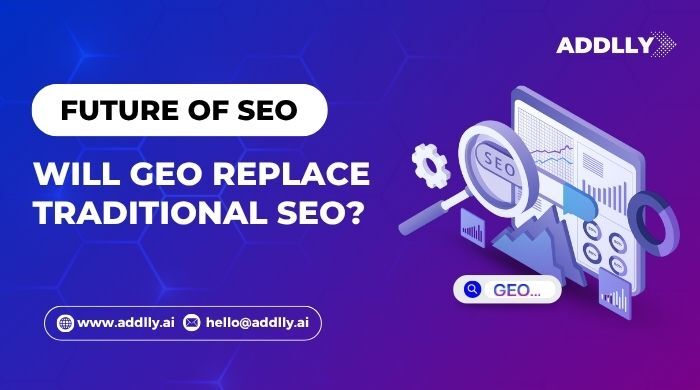As digital marketing continues to evolve, SEO (Search Engine Optimization) remains a cornerstone of online visibility. However, the landscape of SEO is undergoing a significant transformation, largely driven by advancements in artificial intelligence, machine learning, and the growing influence of AI-powered search engines.
This article explores the future of SEO, examining whether Generative Engine Optimization (GEO) will replace traditional SEO practices, and how modern AI tools are changing the way we approach search optimization.
Quick Summary – Future of SEO
The future of SEO is increasingly intertwined with AI technologies, making it important for businesses and SEO professionals to adapt to emerging trends like GEO (Generative Engine Optimization).
- While traditional SEO (keyword research, on-page optimization) remains vital, AI-driven approaches and new search engine algorithms are shifting the focus toward:
- Content creation
- User intent
- Machine learning
- As AI search engines like ChatGPT and Google AI Overviews grow in influence, SEO strategies must evolve to include:
- Natural language processing
- Voice search optimization
- Structured data
- Adapting these technologies will help businesses maintain a competitive edge in search engine results pages (SERPs).
The Changing SEO Landscape with AI
For years, SEO has been a constant fixture in digital marketing. The main goal has always been clear: improve your website’s ranking on search engines to increase visibility, drive traffic, and boost conversions. However, as AI SEO Tools become more advanced and search engines like Google evolve their algorithms, SEO strategies are being reshaped.
AI search engines, predictive analytics, and machine learning are transforming traditional search optimization methods. SEO professionals are being pushed to rethink their approaches, especially in light of Generative Engine Optimization (GEO), a new method aimed at optimizing content for AI-driven search engines.
In this article, we’ll jump into the future of SEO, discuss the key shifts happening in the SEO industry, and analyze how emerging trends, including AI generated content, voice search optimization, and structured data, are altering the SEO landscape.
The Rise of AI and the Role of Generative Engine Optimization (GEO)
AI has been at the forefront of the SEO revolution. Google AI Overviews and Google AI Mode in SERP are setting the stage for a new era of search results that are far more dynamic and context-aware than traditional methods. As AI tools become better at understanding user intent, they are shifting how we approach search engine results.
Generative Engine Optimization (GEO) is a prime example of how search optimization is evolving. GEO focuses on creating AI-optimized content that aligns with AI’s need for structured, actionable, and relevant answers. This includes content designed for zero-click search results, featured snippets, and direct answers, which often appear at the top of search engine results pages (SERPs) and are increasingly powered by AI.
Here’s how GEO works:
- AI Generated Answers: GEO helps optimize content so AI tools can pull direct answers from websites, increasing the chances of appearing in AI-generated search results.
- User Intent and Structured Data: GEO emphasizes user behavior, user queries, and structured data to help AI systems find the most relevant content. By understanding user intent, AI tools can deliver relevant keywords and ensure organic traffic.
- Content Creation at Scale: Using AI content tools, brands can automate content creation and tailor it to match specific search queries and search volume while ensuring it aligns with search engine guidelines and provides actionable insights for the audience.
With AI becoming the backbone of search engines, the traditional SEO focus on keyword stuffing, backlinks, and content formats needs to evolve into a more nuanced approach that accounts for machine learning, natural language, and AI-generated content.
Key Shifts from Traditional SEO to Modern SEO Practices
While traditional SEO practices such as keyword research, on-page optimization, and link building still play important roles, AI and machine learning are adding complexity to SEO strategies. Here’s how SEO professionals can adapt to the changing landscape:
1. Evolving Search Algorithms
Search engines, particularly Google search and other traditional search engines, have become more advanced in understanding the context and intent behind search queries. Search engine algorithms now consider factors like natural language processing, user satisfaction, and machine learning when ranking content. This shift means that simply optimizing for keywords is no longer enough.
- SEO Trend: Marketers need to consider E-E-A-T (Experience, Expertise, Authoritativeness, Trustworthiness) as part of their SEO strategy, particularly when optimizing for AI search.
Read our guide on: How AI Agents Are Reshaping Digital Marketing
2. Voice Search Optimization
With the rise of voice search, understanding user intent has become even more important. Consumers are increasingly using voice-activated devices to perform online searches, meaning that traditional keyword-focused strategies are being replaced by natural, conversational queries.
- SEO Strategy: Optimizing for voice search involves using natural language, targeting long-tail keywords, and ensuring content answers direct questions that users are likely to ask their devices.
3. AI-Generated Content and Predictive Analytics
AI generated content is reshaping how we approach content creation. Predictive analytics and AI tools allow marketers to analyze user behavior, seasonal trends, and search traffic patterns, creating more relevant and timely content. This data-driven approach helps marketers automate keyword research, refine their SEO strategies, and adapt to shifting user preferences in real-time.
- Key Insight: Instead of relying solely on human-written content, AI is now being used to create scalable, personalized content across multiple languages, helping brands reach broader audiences.
Read our guide on: Mastering Content Creation for GEO
How AI Tools Are Shaping Content Strategy
As search engines evolve, so does the approach to content strategy. SEO is no longer just about optimizing web pages for search engine rankings. With AI search engines influencing search visibility, the emphasis is shifting to creating content that is structured for AI consumption.
Key Aspects of Modern SEO:
- Keyword Research: AI tools help automate keyword research and provide insights on search queries and search volume, allowing marketers to create content that aligns with user intent.
- Structured Data: Implementing structured data with JSON-LD enhances search engine visibility and increases the chances of appearing in featured snippets and other AI-driven search results.
- Content Creation: Using AI tools to create content at scale while ensuring that it aligns with search engine guidelines and is optimized for SEO performance.
Content Creation for AI Platforms
In addition to traditional content creation, SEO professionals must now account for content formats optimized for AI, including direct answers, zero-click search results, and predictive analytics. Understanding AI-generated content and its role in search traffic will be a key factor in the future of SEO.
Read our blog on: How to Use UGC to Boost AI Visibility
Will GEO Replace Traditional SEO?
The rise of Generative Engine Optimization (GEO) represents a shift towards a more AI-driven SEO landscape. However, it’s unlikely that GEO will completely replace traditional SEO practices. Instead, it will complement and enhance them by focusing on user behavior, search intent, and AI tools that deliver predictive insights.
Why Traditional SEO Won’t Disappear:
- Keyword Research: SEO still relies on relevant keywords to ensure your content aligns with search queries and user intent. While AI can help automate aspects of this process, understanding the core principles of search optimization is still necessary.
- Search Engine Guidelines: Google and other search engines still adhere to search engine guidelines that demand high-quality content and proper SEO practices like internal linking and mobile optimization.
- Organic Search: The core principle of organic search, creating content that answers user queries and drives traffic, remains relevant. GEO focuses on making content more accessible to AI, but organic search strategies will continue to complement GEO.
The Future of SEO: What’s Next?
Looking ahead, search marketers and SEO professionals need to embrace the convergence of AI search and traditional SEO practices. The key is finding a balance between AI-driven GEO strategies and the foundational elements of SEO that have driven online search performance for years.
Emerging Trends in SEO:
- AI-generated content: AI tools will play an increasing role in content creation, offering actionable insights and enhancing SEO strategies by automating content generation and real-time analysis.
- Voice Search: As voice search becomes more prevalent, marketers will need to adapt their SEO strategies to optimize for conversational queries.
- Machine Learning and Predictive Analytics: With AI becoming more sophisticated, predictive analytics will become a cornerstone of SEO strategies, enabling marketers to understand trends before they emerge.
Checkout our guide on: How to Rank in AI Search Results
Final Words
The future of SEO is undoubtedly intertwined with AI and emerging technologies like Generative Engine Optimization (GEO). While traditional search practices remain foundational, AI tools and machine learning are reshaping the way we approach SEO, making it more dynamic and data-driven. To stay competitive, SEO professionals must embrace these emerging trends, integrate AI-driven tools into their strategies, and remain agile as search engines continue to evolve.
FAQs – Future of SEO
How Does AI Impact SEO Strategies?
AI impacts SEO strategies by shifting the focus toward understanding user intent and personalization. AI tools like machine learning and natural language processing allow search engines to interpret user queries more contextually, enabling smarter content creation. SEO professionals must now optimize for AI-driven search engines by focusing on structured data, content creation at scale, and real-time optimization.
Will Traditional SEO Still Be Relevant?
Yes, traditional SEO practices like keyword research and on-page optimization will still be relevant. However, the future of SEO will require a blend of traditional techniques and AI-driven approaches. Marketers will need to continue focusing on organic search while adapting to new algorithms that prioritize user intent, machine learning, and AI tools.
How Will Voice Search Change SEO?
With the rise of voice search, SEO strategies must evolve to account for conversational queries and long-tail keywords. Voice search optimization requires content to be more natural, precise, and aligned with how users speak rather than type. SEO professionals will need to optimize for direct answers and ensure content addresses common voice search queries in a natural tone.
What Role Does Structured Data Play in SEO?
Structured data is essential for improving search visibility in AI-powered search engines. By using JSON-LD and Schema.org types, businesses can make their content more accessible and understandable to AI, which increases the chances of appearing in featured snippets, direct answers, and zero-click search results. Structured data helps ensure content is categorized correctly and can be referenced by AI tools with confidence.


